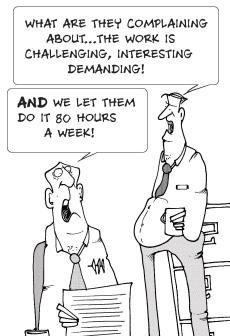We have been writing about the importance of developing a virtual office by establishing your own private social network that becomes your "homebase" on the internet.
Having a virtual office changes the way you interact with your agents, vendors, community, and even competitive agents you are trying to recruit. We have written far too much over the past month to accurately summarize here, so you may want to read the previous posts before reading this excerpt.
In the last edition, Ben listed the two most common questions we hear:
1. What is the manager’s role in the virtual office?
and
2. With all the responsibilities a manager already has, how can this significant responsibility be added to an already full plate?
Ben answered question 1–it is my job to answer question 2.
Before I answer question 2, I want to remind you of a manager survey we conducted in September of last year.
 When we asked managers to list, in the order of priority, the tasks at the core of their job description, the following results were very clear– recruiting was number one, followed by retention, then training and building office culture, then coaching agents, and finally deal-doctoring.
When we asked managers to list, in the order of priority, the tasks at the core of their job description, the following results were very clear– recruiting was number one, followed by retention, then training and building office culture, then coaching agents, and finally deal-doctoring.
When asked in the same survey what managers thought they did best, only 6% of the managers answered "recruiting". Clearly there is a disconnect between stated priority and the desire to perform stated priority.
Here's the point: The survey showed a need for a method to better align the expectations of executive management with the day-to-day performance of the manager.
This got us thinking… perhaps there is a better way to wrap all of the above priorities into one common platform that would make recruiting feel more natural rather than a chore that most managers seem to despise.
While the "work" or recruiting will never disappear completely, what if the execution of the recruiting tasks could be mostly done as a natural extension of ongoing conversations within the normal office dialogue?
This is the goal of RecruitingSocial.
So, let's get back to the question–how do you add something like managing a virtual office to your plate if you're already maxed out?
Like any duty, you must rank its level of importance. Once a duty is ranked, you must follow through and devote the appropriate amount of time to the duty in order meet your goals.
How many people truly spend the first two hours of their day working on their most important tasks? In interviewing thousands of people as a psychologist, I have found that most people don't.
I would recommend changing your daily routine so that your first and most productive hours are focused on completing your higher ranked duties.
Here is a suggested framework:
Step 1: Spend 30 minutes scanning email and only responding to urgent items.
Step 2: Turn off email and other distractions. Focus for 2-3 hours on completing your highest ranked duties.
Step 3: Take a lunch break away from your desk. Leaving your computer and recharging is the key to being productive after hard focus on your most important duties.
Step 4: Devote the second half of your day to taking care of ongoing tasks and other reactionary work that requires less mental stamina.
RecruitingSocial centralizes the duties that are, in most cases, highly ranked. And, it offers the ability to complete a lot of highly ranked duties in one central platform.
It is our hope that RecruitingSocial will soon be a part of your daily routine. In our next blog, we'll show you how you can start dipping your toe in and seeing how this works.
 Editor's Note: This article was written by Dr. David Mashburn. Dave is a Clinical and Consulting Psychologist, a Partner at Tidemark, Inc. and a regular contributor to WorkPuzzle. Comments or questions are welcome. If you're an email subscriber, reply to this WorkPuzzle email. If you read the blog directly from the web, you can click the "comments" link below.
Editor's Note: This article was written by Dr. David Mashburn. Dave is a Clinical and Consulting Psychologist, a Partner at Tidemark, Inc. and a regular contributor to WorkPuzzle. Comments or questions are welcome. If you're an email subscriber, reply to this WorkPuzzle email. If you read the blog directly from the web, you can click the "comments" link below.

